Photo by Kate Nuelle
“Before we begin, I’d like to know more about who you are first. What are the things you value? Where are you from? What do you enjoy doing in your spare time?”
These are just some of the questions Lapétra Bowman, advising coordinator, hopes new professional advisers will be asking their advisees next fall when a new advising model is implemented at Trinity. The new model will eventually employ six full-time advisers that will take over some of advising responsibilities that currently fall on faculty in advising undeclared students.
The new advising initiative was crafted by a task force headed by Bowman and David Tuttle, dean of students.
“My vision for this advising initiative is specific to Trinity, so it isn’t something we’ve necessarily seen anywhere else. This can’t be based on any other institutions’ model of advising because we are innovators and we want this to be specific to Trinity,” Bowman said.
The push for a new advising model comes from student complaints about the current faculty advising model and the administration’s intention to raise Trinity’s four-year and six-year graduation rate and the retention rate between their first-year and sophomore year.
Unlike the old faculty advising model, the new model will center around professional advisers advising undecided first-year students beginning with the class of 2024.
“The first-year students coming in the fall will be assigned, to not a faculty adviser, but to a professional adviser who will be working with them, really, from the moment they step foot on campus and facilitating conversations throughout the summer,” Bowman said.
Three new professional advisers will be hired this June and then three additional advisers will be hired next June. They will be trained by Bowman, who has extensive experience in academic advising at her previous institution, as well as training future advisers.
“Dr. Bowman has seen 225 students last fall for supplemental advising which, I think, is a strong indicator that she will be able to train the new advisers well,” Tuttle said.
Bowman intends for professional advisers to help students navigate Pathways and their intended major requirements.
“Each adviser will be trained in specific majors. So you will have a social science adviser, or a liberal arts adviser, or one that is engineering specific, etc. They will know prerequisite sequences. They will attend faculty meetings and have the most up-to-date information about students and courses,” Bowman said.
Each of the six new advisers is expected to have a caseload of about 250 students, which is a typical load for advisers at higher-education institutions, according to Bowman.
Advisers will be involved in the transactional advising (degree checklists, course selection, etc.) as well as what Bowman called the transformative pieces of advising.
“Through advising, we want to begin having those holistic and life-affirming conversations about connecting career exploration through class exploration.”
The new advisers will be expected to have a “high-touch” relationship with students.
“[High-touch] means that your adviser is going to be available to you, not just for that one meeting for registration, not just for ‘I need to add/drop a class,’ but also ‘I’m having a life-crisis right now — should I drop this class? I thought I was pre-med and now I’m more interested in epidemiology.’ We don’t want to have space be limiting. So the adviser will be available to you via email or via Zoom appointment (a Skype-like software). Even if you’re studying abroad, you should still be able to talk to your adviser.”
The new model will utilize the C.A.N. model of advising: Congratulate, Alert, and Nudge. Advisers will be expected to stay in close contact with students, congratulating them on academic or extracurricular success, alerting them of grade or course updates, or nudging them to talk to certain people to further their academic and personal goals.
First-year students are expected to stick with these professional advisers until they declare their major.
Advisers will also be trained to view student success holistically. For example, they will be expected to know how and when to refer students to Counseling Services.
“We know that nationally, there has been a 30 percent increase in anxiety and depression in the last few years. It’s true on our campus and it’s true nationally in the U.S. I think it’s the spirit of the times. We have children in cages 400 miles from here and it’s difficult for most of us. You are generation Z. You are empaths. Part of advising will be to assuage some of those pangs and anxieties,” Bowman said.
What role will faculty play once this new model takes effect?
“This model frees faculty from dealing with the transactional details of advising and allows them to build more mentoring dynamics with students,” Bowman said.
Bowman envisions this new model taking form in a new advising center, the location of which is to be determined.
“I think it will be beneficial to have academic advisors, who really know academic advising inside and out, and they know what’s going on so you know what’s going on,” says Zoe Grout, Trinity University Student Advisor for Peers on Academic Probation.








Manju Thomas • Feb 27, 2020 at 10:31 pm
Students definitely can benefit this support from advisers .Truly Innovative and exciting initiative !